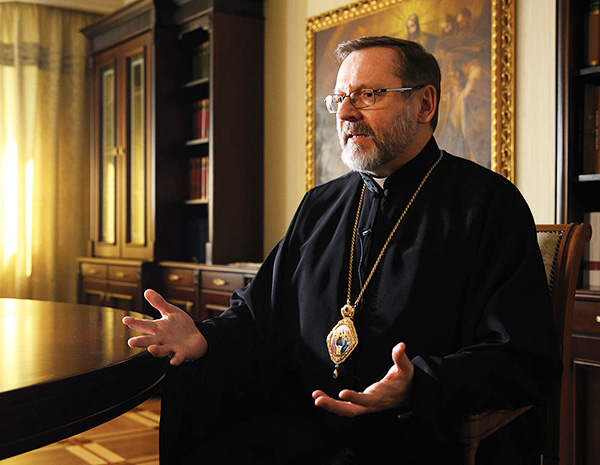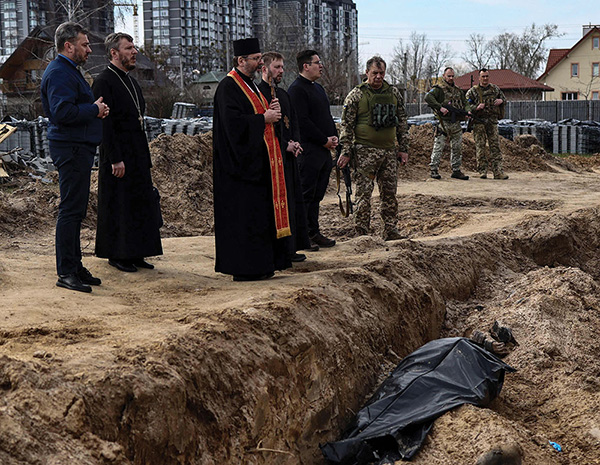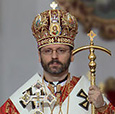Love Gives Birth to Heroes
- MAJOR ARCHBISHOP SVIATOSLAV SHEVCHUK
An interview with Major Archbishop Sviatoslav Shevchuk, head of the Ukrainian Greek Catholic Church, about faith and courage in a time of war.
 Major Archbishop Shevchuk is pictured during an interview July 26 at his residence in Kyiv. Photo by Andrey Gorb
Major Archbishop Shevchuk is pictured during an interview July 26 at his residence in Kyiv. Photo by Andrey Gorb
"The whole world is wondering today: How do Ukrainians have the strength to resist?" observed Major Archbishop Sviatoslav Shevchuk during his homily at the Cathedral of the Resurrection of Christ in Kyiv on Sept. 25. "We answer: Ukrainians love! … We are strong in our love, which we draw from the ever-flowing source of divine love, which is given to us through the honest and life-giving cross."
Since the Russian invasion of Ukraine began Feb. 24, His Beatitude Sviatoslav has been a resounding voice of hope and strength for his suffering Church and, indeed, all of Ukraine. In homilies and addresses, including daily video messages broadcast from Day 1 of the war, he has eloquently defended Ukrainian national identity and freedom and promoted peace in the face of unjust aggression.
Born near Lviv in 1970, Shevchuk was ordained a priest in 1994 and a bishop in 2009. He succeeded Cardinal Lubomyr Husar as head of the Ukrainian Greek Catholic Church in 2011 at age 40. Together with Archbishop Mieczysław Mokrzycki of Lviv, Major Archbishop Shevchuk was among the first Ukrainians to join the Knights of Columbus in May 2012. He later delivered the States Dinner keynote address at the 136th Supreme Convention in 2018.
His Beatitude spoke with Columbia in late July about the faith-filled endurance of his suffering people, the Church's response to their many needs, and his gratitude for the Order's ongoing efforts.
Columbia: Can you please speak about your personal experience since Feb. 24, when this gravely unjust war on the people in your country began?
Archbishop Sviatoslav Shevchuk: It is not easy to describe what we have gone through. In the beginning, everybody was in shock—we suddenly awoke to the sound of Russian missiles, Russian helicopters going around our cathedral. The sounds of war came to the city of Kyiv.
Immediately our attention as bishops and priests focused on the salvation of the lives of the people.
Immediately our attention as bishops and priests focused on the salvation of the lives of the people. In our cathedral, we gave shelter to nearly 500 people each day, providing food, medicine, everything they needed. We also helped those who were willing to be evacuated from Kyiv or cities in the east of Ukraine, to find a safe place to move in western Ukraine or even other countries.
When the Ukrainian army pushed back the Russian troops, the tragedy was shown to the world. Immediately, I visited those places, known to everybody in the world today: Bucha, Dnipro, Borodyanka, Irpin. The experience of praying at the uncovered mass grave [in Bucha] was horrible. At the edge of the grave, I saw the mutilated bodies of young men and women, and then we started to pray. But in five minutes, I realized suddenly that I was standing on other bodies beneath me, for not all of that mass grave was uncovered. In that moment, I felt that I could have been one of them, and a deep question rose in my heart: "God, why has this happened? And why I am alive and they are dead?" That question is still knocking at my heart and in my head.
Columbia: Can you summarize how the situation has evolved in Ukraine?
Archbishop Shevchuk: Nobody expected that Ukraine would be able to withstand such an invasion. But we are fighting and showing the world that the myth of a victorious Russian army has already been debunked in Ukraine.
We as Christians, as bishops, as priests, we are continuing to help the people. We have already assisted a fifth wave of internally displaced persons. The latest groups fleeing their cities and villages in the eastern and southern part of Ukraine are the poorest of the poorest of the poor. They have no means to move forward, to go perhaps to western Ukraine. And they are knocking on our doors in Kyiv, Poltava, Kharkiv.
We are trying to open our hearts, not only the doors of our churches, to provide for them. First of all, the open hearts and minds of Christian love. And, with the help of our partners, we're trying to provide first aid, food, clothing, medicine, shelter. So it's sad to say that the war continues, yet we continue to serve.
"People are looking for meaning: 'How are we supposed to live when my house is destroyed, when my dearest ones are killed?' The response to such existential questions can only come from the eternal perspective, from God's Word and wisdom."
Columbia: Throughout the conflict, you've asked your priests to go to the people. Why is it important for the Church to be with the people during this time?
Archbishop Shevchuk: The Church is a people of God, a community. When the Ukrainian community is undergoing such adversity and tragedy, everybody suffers—and those in charge of that community have a primary duty to be close. Very often we can do nothing; we cannot change the circumstances. But we can say, "I am with you."
Very often we can do nothing; we cannot change the circumstances. But we can say, "I am with you."
I remember when the capital was almost encircled by the Russians. I visited the mayor of Kyiv, Mr. [Vitali] Klitschko, and he told me that more than food or clothes, we expect from the Church a word of hope. In such conditions, the Church, as a representation of God's presence, has a special duty. We are a community that brings hope to the hopeless—not only food to the hungry.
People are looking for meaning: "How are we supposed to live when my house is destroyed, when my dearest ones are killed?" The response to such existential questions can only come from the eternal perspective, from God's Word and wisdom.
Columbia: In daily video messages, you have lamented the horrors that played out in your own archeparchy in Kyiv. What inspired you to make this a pastoral priority?
Archbishop Shevchuk: We are facing an invisible battle. In the Christian ascetic life, we call this the battle between good and evil. In order to be able to prevail in such a battle, we have to be spiritually and morally stronger than our enemy. In order to withstand those who bring the death and destruction in our land, we cannot permit that evil and hatred to conquer our hearts. Of course, maybe the first reaction to such an atrocity could be a hatred. But through the Christian ascetic life, we have a special ability to transform hatred into courage. And courage is a virtue that helps us to be successful in our battle.
That was the intention behind the majority of my daily messages—to save the heart of Ukrainian Christians from the temptation of hatred. If we are able to overcome our hatred with a love for our homeland, then we will prevail against the Russian invaders. This was the most important pastoral duty, to cultivate love. Because we are conscious that hatred gives birth to criminals, but love gives birth to heroes. Ukraine is revealing itself to be a nation of heroes.
Columbia: You also frequently ask for prayers for the men and women of Ukraine on the front lines. What has your interaction with them been like?
Archbishop Shevchuk: It is very important to underline right now that the professional soldiers are not the only ones giving up their lives on the front lines for Ukraine. There are also former teachers, IT specialists and other kinds of professionals; everybody right now is trying to defend our homeland. This is why we have been able to withstand the invaders.
If we are able to overcome our hatred with a love for our homeland, then we will prevail against the Russian invaders.
When visiting them, I always ask, "As a Church, how can we help you? What is your primary need?" Everybody responds, "Please pray for us." So those who are defending Ukraine are asking for prayers.
Everybody on the front lines has also told me, "There are no atheists here; everybody prays." In that place, where the human person stands between life and death, our soldiers experience the presence of the Almighty. Many are discovering God's presence for the first time in their lives. This is why the special accompaniment of military chaplains and the Church is so needed right now.
Columbia: Neighboring countries have taken in millions of refugees fleeing the violence in Ukraine. What does it mean for Ukrainians to have that help, and what hope is there for them to return?
Archbishop Shevchuk: I would like to thank all our friends and neighbors who are giving their houses, their facilities, in order to help those who were forced to leave Ukraine. Te very possibility of finding a safe place outside of Ukraine was a great sign for us that we are not alone in our suffering, that we are not abandoned by God, by people of good will.
Many people who left Ukraine, or were forced to leave their homes, refuse to be called refugees or displaced persons. Many of them are willing to come back when the war is over. I have relatives staying in my house in western Ukraine, but each day they ask themselves, "Is it time to go back?"
So Ukraine is expecting that her children will come back home. Of course, not everybody will immediately be coming back—but the homeland needs you. The children of Ukraine who are today spread around the world, especially in western Europe, we hope that one day with your experience, maybe with new knowledge and the ability to speak different languages, you will come back and enrich Ukraine.
 Major Archbishop Sviatoslav Shevchuk leads clergy and soldiers in prayer April 7 at a mass grave in Bucha, Ukraine, discovered after Russian forces withdrew from the town days earlier. Photo by Ronaldo Schemidt/AFP via Getty Images
Major Archbishop Sviatoslav Shevchuk leads clergy and soldiers in prayer April 7 at a mass grave in Bucha, Ukraine, discovered after Russian forces withdrew from the town days earlier. Photo by Ronaldo Schemidt/AFP via Getty Images
Columbia: The Knights of Columbus in Poland and Ukraine, aided by the Order's Ukraine Solidarity Fund, have been working to get relief to those who are displaced and in need. What impact is this having?
Archbishop Shevchuk: I will take advantage of this opportunity to express my profound gratitude to the Knights of Columbus, especially in Poland, and as well in Ukraine, for the outstanding social service and Christian solidarity that they are providing for victims of the war.
We can enumerate many different good deeds that they have done already, but I have to say that the most important witness they give to the Ukrainian people is the witness of Christian love and solidarity. I thank all of them for being such good brothers to one another and also to those who are in need and who suffer in Ukraine today.
Columbia: Can you say a few words about the history of the Knights of Columbus in Ukraine?
Archbishop Shevchuk: I am really proud to be among the first Knights of Columbus in Ukraine, together with His Excellency Mieczysław Mokrzycki. I would say that the moment when the Knights of Columbus was established in Ukraine was providential. It was shortly before the Russian aggression against Ukraine started. And because we had the brotherhood of the Knights of Columbus, we were able to be so efficient from the very beginning in helping those first victims of [the Maidan Revolution] here in Kyiv, and then the victims of the Russian invasion in Donbas and the occupation of Crimea.
The presence of the Knights in Ukraine was a kind of rebirth, because from the very beginning of Ukrainian history, that noble ideal of knighthood was present within the spirit of the Cossacks in Ukraine. Such an ideal gave expression to the highest level of the nobility of the human soul: giving up one's life for your neighbors, your Church, your nation.
Today, more than 2,000 Knights of Columbus in Ukraine are giving an outstanding Christian witness to those who are in need.
Before the Knights of Columbus was established in Ukraine, my predecessor, Cardinal Lubomyr Husar, and I were looking for a special community for men that would give Christian expression to the role of the father in the family and also encourage men to be more active in the life of the Church. Today, more than 2,000 Knights of Columbus in Ukraine are giving an outstanding Christian witness to those who are in need. They are also giving witness to fathers of families and to those who are defending Ukraine that they are not alone in their noble fight but are supported by a community of brothers.
Columbia: Is there anything you would like to say to Knights in Ukraine and throughout the world?
Archbishop Shevchuk: I would very much like to thank all Knights of Columbus around the world for supporting us during this cruel moment in Ukrainian history. Thank you for helping us. Thank you for praying for us. And thank you for providing a special humanitarian assistance for those who are in need in Ukraine.
I would also like to encourage all of you: Do not grow tired of doing good or of serving the noble cause or of bearing witness to Christ even in today's cruel circumstances. Even in the midst of the war, we can find happiness, because we are happy only when we are achieving a fullness of human life in Christ. Don't grow tired of bringing a Christian witness in this world.
 This is Meaghen Gonzalez, Editor of CERC. I hope you appreciated this piece. We curate these articles especially for believers like you.
This is Meaghen Gonzalez, Editor of CERC. I hope you appreciated this piece. We curate these articles especially for believers like you.
Please show your appreciation by making a $3 donation. CERC is entirely reader supported.

Acknowledgement
 Major Archbishop Sviatoslav Shevchuk. "Love Gives Birth to Heroes." Columbia (November 2022).
Major Archbishop Sviatoslav Shevchuk. "Love Gives Birth to Heroes." Columbia (November 2022).
This article appeared in the November 2022 issue of Columbia magazine and is reprinted with permission of the Knights of Columbus, New Haven, Conn.
The Author
Born near Lviv in 1970, Shevchuk was ordained a priest in 1994 and a bishop in 2009. He succeeded Cardinal Lubomyr Husar as head of the Ukrainian Greek Catholic Church in 2011 at age 40. Together with Archbishop Mieczysław Mokrzycki of Lviv, Major Archbishop Shevchuk was among the first Ukrainians to join the Knights of Columbus in May 2012. He later delivered the States Dinner keynote address at the 136th Supreme Convention in 2018.
Copyright © 2022 Columbia

